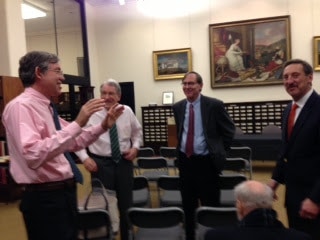The Junto Celebrates Typee, Trenton, and Turtles

Junto panelists Bill Reese, Joe Felcome, Librarian Jim Green, and Clarence Wolf share collecting tales with renowned collector Michael Zinman (seated).
Members of the Library Company Junto gathered on December 4 for a panel discussion on collecting featuring shareholders and notable collectors Bill Reese, Joe Felcone, and Clarence Wolf. Reese, who owns the William Reese Company in New Haven specializing in Americana and Literature, collects the works of Herman Melville; Joseph Felcone, proprietor of Joseph J. Felcone, Inc., of Princeton, is an authority on and specializes in the history and geography of New Jersey; and Clarence Wolf, owner of the MacManus Company in Bryn Mawr and an early Americana expert, has collected American herpetology since he was a boy.
Clarence Wolf, a Library Company Trustee, organized the event, which also featured an informal exhibition of some of the collectors’ prized finds. Bill Reese brought a number of Melville books and manuscripts, the best of which was Melville’s copy of a prime source for Moby Dick, Obed Macy’s History of Nantucket, Boston, 1835. Joe Felcone brought a number of rare New Jersey imprints, including the first book printed in South Jersey, a forgotten anonymous novel called The Glebe House, Salem, 1799; the first American edition of DeQuincy’s Confessions of an English Opium-Eater, which was printed in Bridgeton in 1823; and the first printing Benjamin Franklin did for the government of New Jersey, a compilation of the acts and laws passed by the Assembly in 1733, of which only two other copies are known. Among the items Clarence Wolf brought were the first American herpetological book, Benjamin Smith Barton’s 1796 Memoir Concerning the Fascinating Faculty Which Has Been Ascribed to the Rattle-Snake, and (described as his most-valued possession) Barton’s original watercolor depiction of the spotted salamander, which was made into a copperplate illustration published in the American Philosophical Society’s Transactions in 1804.
Attendees were on the edges of their seats for more than an hour of great tales of book and print collecting. Members of the Junto provide financial support for the acquisition of rare books, prints, and photographs. The name is taken from the “Club for Mutual Improvement” formed by Franklin in 1727, which turned out to be the nucleus of the Library Company. Members of the original Junto shared an interest in books and an enjoyment of good fellowship—and our Junto carries on this tradition with a lively annual get-together. Support the Junto today with a gift of $100 or more and reserve your place at this year’s event.

Leave a Reply
Want to join the discussion?Feel free to contribute!